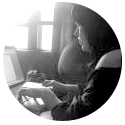Writing Comic Fiction
This article originally appeared in the SA Writers' Centre March 2011 newsletter.
As writers, one of the few statements we can probably all agree on is that art is subjective. There’s wiggle room within that definition, too; you can appreciate (or learn to appreciate, in some cases) the work that goes into a particular piece even if you can’t stand the end result. I, for one, will never enjoy clown portraits, regardless of how lovingly they’re airbrushed onto velvet or rendered in cross-stitch so minute the artist went blind doing the red nose.
Comedy, though, is a different beast. There is no slow burn in comedy; it is governed purely by instinct. A pratfall, a double-take, a whip-lash come-back—if these things make us laugh, they do so instantly. What makes assessing it tricky is the fact that what appeals instinctively to one person doesn’t necessarily appeal to the next. One man’s Black Books is another man’s Two & A Half Men, just as one person’s The Catcher In the Rye is another person’s Twilight. (I can already hear people shrieking at the comparison. Forgive me.)
You can imagine, then, my mixed emotions at being asked to write a piece on comic fiction for the SAWC. Flattered? Absolutely. Beset with terror? That too. After all, no-one can claim authority on What Makes Things Funny—at least, no-one who has taken their medication. With that in mind, I offer: Lia Weston’s Totally Authoritative Guide on What Makes Things Funny.
Comedy is both polite and sharp.
Comedic writing works best when the language is precise. Flabby prose only dilutes the joke. I’m a huge fan of dry humour, and it’s the combination of polite, crisp language and the needle sting violence of the punch line which make it work so well. The shock heightens the humour. Bill Bryson, whom by all appearances is a mild-mannered gentleman who enjoys countryside rambling and campaigning against littering, is so good at this. To wit (ho ho!):
The fog had gone. The air was now still and clear, and the sky was bright with stars. ... It was all most fetching, but I was far too cold to appreciate it. I dug shiveringly through my backpack and extracted every potentially warming item I could find: a flannel shirt, two sweaters, an extra pair of jeans. I used some woollen socks as mittens and put a pair of flannel boxer shorts on my head as a kind of desperate headwarmer, then sank heavily back onto the bench and waited patiently for death's sweet kiss.[1]
Though the imagery of Bryson transforming himself into a human laundry basket may make you smile, it’s the last six words that deliver the gasp and blow. (He’s also an expert at knowing exactly when to curse, and why it’s an excellent idea to use such language very, very sparingly. This is probably why Christos Tsiolkas doesn’t write comedy. Intentionally, anyway.)
Truth is the anchor.
Regardless of style, comedy needs a kernel of truth at the heart of it—it’s the anchor that lets us appreciate the joke. Even in absurdist comedy, which some people would consider to be defined purely as having no relationship to real life, there’s a core of genuineness we need to be able to relate to in order to make it work. Arthur Dent is the human anchor for the Hitchhiker’s Guide series—the straight man in the dead parrot sketch, if you will. Without his Everyman link, there’s little for the reader to relate to, and the writing would be in danger of collapsing under the weight of its abstraction. Absurdity itself is tricky to get right: too much of it and the work becomes bloated and weak; too little and people will wonder what the hell you’re on about. There’s a very fine line between free-form comedy and incoherent rambling, and truth is the lifeline that connects them. (A priest, a donkey, and an Irishman walk into a bar. “What’ll you have?” said the bartender. “Don’t ask me,” said the donkey, “I don’t even know what I’m doing here.” See? Very easy to get wrong.)
Similarly, use Quirk with caution. So often, How To Write advice says, “Make your characters quirky! They need to be compelling! Wacky! Or else no-one will like your book and you’ll never get published and you’ll be working at the department of health and social services forever and even your go at editing the departmental newsletter will pass by unappreciated and unnoticed and it’s all because your characters aren’t QUIRKY ENOUGH.” I repeat: quirk with caution. Your reader can spot a fake instantly. Characters who have moments of genuine oddness can be compelling, but someone who likes to lick batteries at lunchtime and only wears cerulean blue purely for the sake of it comes off as a giant prat on the page. “Who is this wanker?” the reader thinks, vowing to kick him in the shins if they ever meet him. This is not, ideally, the reaction you want as a writer. Unless you’re writing a novel about a giant prat.
Hypocrisy is a goldmine.
It’s hard to write truthfully about people without being a serious observer of the way they behave, and, more importantly, the way they think they behave. The sharpest observations, the ones that make us wince even as we’re laughing, are the ones which skewer not only our failings but our sad ways of attempting to cover them up. To use a TV reference, BBC’s The Office was a perfect character study of one man’s struggle with self-perception versus reality. We love self-deluded characters. We practically salivate when observing puffed-up buffoonery, waiting for the moment that they’re taken down, preferably with force. To sharpen your pen, cultivate intense curiousity. Once you’ve figured out why people do the things they do, you can start to make fun of it. Austen was a master of this, and I’m always surprised that she’s not listed as one of the great comic writers more often... but that’s an essay for a another time.
Sex, and not in the way you think I mean.
Nothing makes my heart sink like an “HILARIOUS LOL LOL OMG SO TRUE!!!!!!!!!!!!!!” email forward. Guaranteed to fulfil none of the subject line promises, it tends to fall into one of two camps: “women are smart and funny while men are crap at taking directions” (if it’s from a woman) or “why beer is better than a woman” (if it’s from a man.) Thinking of unleashing your own home-grown tellin’-it-like-it-is just-sayin'-insert-painful-and-dated-cliché-here comedy on the world? Then I beg of you: don’t tell gender-based jokes[2]. Look around you. ‘Life coach’ is considered a legitimate career choice, Tony Abbott leads a political party, and Doggles exist: we live in a very odd world. Surely “my husband couldn’t find the milk in the fridge with a map and a sign that says, ‘Here Be Milk’” is not your A-Grade material. While we’re talking clichés, the following phrases should also be struck from your lexicon forever: talk to the hand; I don’t think so; you go, girl!; go [insert name], go [repeat name]; actually, any variant with ‘go’ in it. (And if you’re someone who forwards anything with “LOL” in the subject line, please stop. Your friends may never admit it, but they’re currently deleting your emails without reading them.)
Comedy is not desperate for your approval.
The reason why most amateur stand-up is singularly awful to watch is because the person on stage is dying for you to laugh. “I’m wacky! Check out my funky hair! Please, love me! Wait—don’t leave! Did I tell you the thing about how a beer is better than a women?” It’s the same with the written word. We’ve all seen examples of a potentially perfect punch line ruined by lumpy, heavy-handedness. It’s like riding a wooden cart along a bridge and watching pieces of it fall off, ricocheting into the crevasse below. Throwing more stuff at it (bigger reactions, another layer of hilarity) doesn’t work. “Mayday! Mayday!” the reader thinks. “We’re going down!” Yes, you are, and you’re taking everyone with you. Do not over-explain the joke. Actually, don’t explain the joke at all if you can avoid it. Comedy that goes overboard appeals to five-year olds and the kind of people who line up to see Big Mama’s House IV: Still Milking A Dead Horse. Presumably, neither of these people are your target audience. Good comedy requires a delicate touch. (I won’t say ‘subtle’ here, as not all comedy is subtle. Again, an essay for another time.) Convoluted circumstances where you force your punch line into existence don’t work. If your humour is dry (in addition to Bryson and Austen, Stephen Fry, Garrison Keilor, and Lisa Lutz are very good examples of this style), it’s always better to pull back. Clever humour is organic, and the best kind sneaks up into the work and sucker-punches you. (There’s that violence thing again.) Similarly, use metaphors and similes sparingly. Lately, I’ve been finding writers who seem to have only just stumbled upon the power of the simile and are so excited by it that they’ll use it as a comedic crutch again and again and again. ... like (something) on acid! ... like (celebrity) on a bender! (Though not a book, pick up any issue of Women’s Health and choose a page at random; I can almost guarantee there’ll be one on there.) When used correctly, a well-chosen metaphor can be devastating. Over-use them, however, and your reader will think they’re the only weapon in your arsenal. Your work will be devalued as a result.
Find your own voice.
Imitation may be the sincerest form of flattery, but it’s deeply irritating if all you can be is a pale copy of the original. Everyone has influences which shape and form their style—your job is to take the best aspects from yours and marry them with your individual take on life. As a character trait, I believe optimism is helpful to comedians (which is odd, seeing as so many of us suffer from depression); the ability to see the funny side in pretty much anything is a boon to the comedic writing process. The mantra which has gotten me through many difficult moments is that an awful day today will make an excellent anecdote tomorrow. The trick, of course, is to work out which anecdotes people actually want to hear about, choose your words very carefully, and deliver the joke without expecting applause. Remember: no-one likes comedy that begs.
These notes are just a rough guide to what I’ve personally found works—and, more importantly I think, what doesn’t work—in my own pieces. In the end, all I can write is something that makes me laugh, and if someone else finds it funny, that’s a bonus. Plus, there’s nothing more gratifying than someone telling you that you’re funnier than Big Mama’s House. Praise I’ll take to the grave.
(c) Lia Weston, 2011
[1] Bill Bryson, Notes From A Small Island (Harper Perennial, 1997, 978-0380727506)
[2] If you take only one thing away from this article, let it be: DON’T DO THIS.







